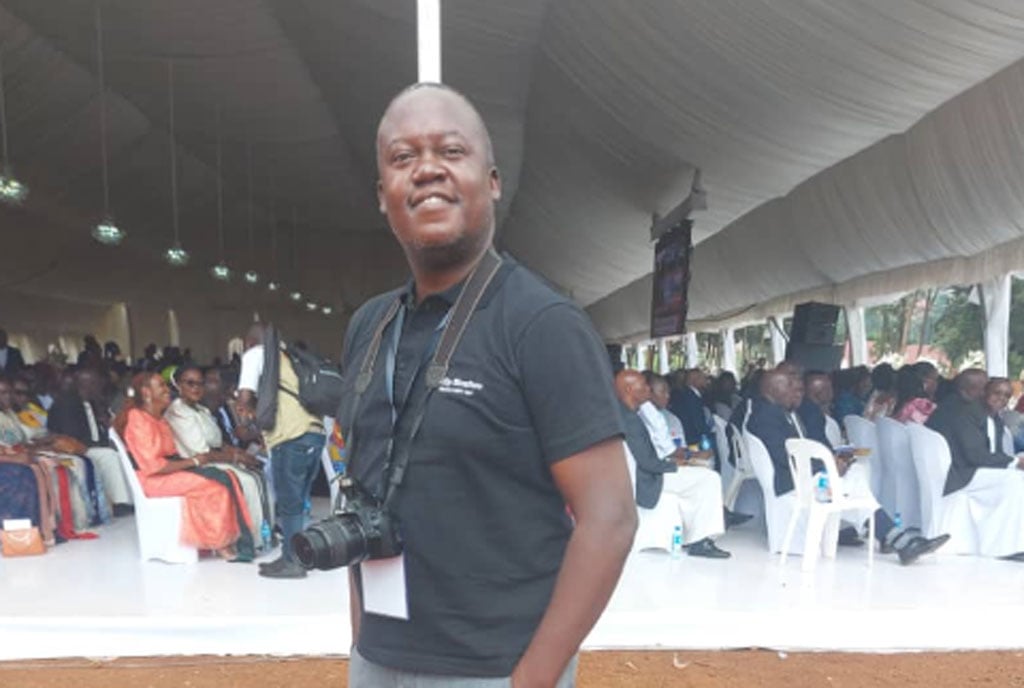How Uneb has tightened the noose around exam cheats

L-R: Teachers Vincent Atukwase , Wenecelaus Twongereirwe and Robert Kintu appearing before a Chief Magistrates Court in Masaka City on December 14, 2022. PHOTO | RICHARD KYANJO
What you need to know:
- Candidates are required to be seated in the examination rooms 30 minutes before the paper starts, and not 10 to 15 minutes as it was the case before to avoid last-minute tips or sharing of the would-be examination paper.
As candidates begin their Primary Leaving Examinations (PLE) on November 6, the Uganda National Examinations Board (Uneb) has frustrated those who want to engage in malpractices.
A total of 798,763 PLE candidates were briefed on Monday, after which they will sit for Mathematics, Social Studies and Religious Education today and Integrated Science and English tomorrow.
Last year, Uneb revealed that 15 cases pertaining to the examination malpractices were reported during PLE. These include impersonation, external assistance to candidates, destroying of examination materials, mainly security envelopes, carrying examination papers and unauthorised possession, and electronic sharing of content or information purported to be Uneb examinations.
Uneb Principal Public Relations Officer Jennifer Kalule, in a statement issued on November 20, 2023, said the cases were detected and the culprits were facing the law. “Some of these cases were reported to police and the suspects will appear in court to answer different charges, while others will be handled by the Board’s examination security committee,” she said at the time.
However, a teacher who will not be named because of his self-incriminating information, says by having the candidates’ briefing on Monday and not last Friday as has been the norm, Uneb has scored highly in its bid to curb examination malpractices.
“The change in days denied us an opportunity to access the papers during transportation and have the entire weekend to revise it with the pupils,” the teacher said, adding that things are now “tight”. “But as Uneb tightens, we are also not sleeping; we shall manage them. For example, if candidates are doing my paper, I will access a copy, go to the latrine and wait there. “The pupils already have the basic knowledge but at that time, it is just a matter of guiding a few we know can get distinctions, and those are the ones we request to visit the latrine and find me there,” he added.
The teacher further fronted some desperate measures that can be taken, including asking a bright pupil to quickly complete his or her answer sheet and immediately switch with their immediate neighbour, the discrepancies in their handwriting notwithstanding. “The invigilators are teachers like me, while the examiners have no time to compare handwriting because they are making money,” he noted.
Another anonymous teacher said previously, that examiners used to cram school numbers, but these days, once the candidate enters the examination room, they are given a “random number” which shows the district and school.
“It is different from the pupil’s index number and every paper has got its random number,” the teacher said, adding that also currently, pupils are Last year, Uneb revealed that 15 cases pertaining to examination malpractice were reported during PLE.
Candidates are required to be seated in the examination rooms 30 minutes before the paper starts, and not 10 to 15 minutes as it was the case before. This 30-minute rule, he says, eats into the free 15 minutes he previously had to give the candidates last-minute tips or share the would-be examination paper.
“Personally, if the ‘30-minute rule’ wasn’t in place and I received a tip of the paper prior, 10 minutes were enough for me to go through that paper with my pupils,” he further explained.
He added: “The reason I am complaining about these 30 minutes is because there are schools that delay to start. So, if you had a teacher in such a school, they would quickly ring me who has started and I relay some of the questions to him, which he eventually shares with the pupils.” According to this teacher, papers being sat for by candidates these days are different from the ones he sat for due to the new curriculum. “That man (Odongo) has managed to curb examination malpractices, and out of 100 percent, I give him 85 percent or 90 percent,” he said. Asked if he has ever got the “real” examination paper, the teacher responded: “For the ten years I have been in service, I cannot fail to access the actual Uneb paper. Before Covid-19, I got the correct morning examination paper the previous evening at 10pm.”
He added: “They were being sold; I have my people who even notified me of any changes made to a particular paper and which one was next in line and showed up with the correct one. “My head teacher is on a platform where one pays Shs1m to access a correct PLE paper a day prior to the date and Shs500,000 to access it on that day for a few hours before time.”
In Kamuli District, Uneb has played hoax to those hawking and peddling its question papers which is a departure from previous years when PLE papers floated the market but turned out to be fake in the end.
Other teachers say over the years, parents and candidates realised that it was a futile attempt to chase after these papers and rather have them (teachers) carry out intensive revision for the candidates.
Further still, the heavy deployment of Uneb scouts and monitors by the government, including at village level as spies, operatives, and with Resident District Commissioners (RDCs) all over the area like ordinary police has kept examination malpractices in check.
Mr Nicholas Akol, a Uneb examiner and seasoned teacher of Social Studies in Kamuli District, says the setting technique nowadays makes cheating in the exam room not practical.
“We have had a few candidates helped which we could easily detect during the marking exercise,” he said.
Mr Edgar Balondemu, a teacher at Kagumba in Kamuli District, said cheating during examinations is soon becoming a thing of the past following the changing trends of examination settings involving logic, comprehension, knowledge and application.
“Teachers and schools have been taken to mini boarding for concentration, and having examiners’ seminars and going through various exam papers. The stringent conditions and punitive measures by Uneb has also scared off officials from engaging in examination malpractices,” he said.
Ms Stella Lubuga, the head teacher of Bukusu Primary School in Nawanyago Sub-county, Kamuli District, quoting a verse in the Bible to explain why examination malpractice has reduced, asks: “What does it benefit a man to gain the whole world and lose his soul?”
“How can I get involved in malpractice for the few candidates and risk losing a job I have secured for over 20 years, support my family and look to my pension? “Because all documents are secured, the cheating officials risk being recalled, jailed and have their certificates cancelled, in addition to the rigorous interrogations of the candidates, Uneb officials and school heads suspected, it puts oneself on cautionary mode,” Ms Lubuga said.
In Namutumba District, Mr Livingstone Musala, a teacher at Raise and Hope Nursery and Primary School, said Uneb’s pressure on school inspectors to monitor and sensitise schools to the dangers of examination malpractices has helped. “In the past, inspectors of schools had slept on their jobs, leaving only head teachers and a few teachers to monitor and inspect the examination process. This gave schools a chance to cheat because there was no tight supervision,” said Mr Musala.
Mr Estheluko Walwasa, the head teacher of Nsoola Primary School, said a strategy adopted by Uneb to have distributors escorted by police officers as they distribute exams to (examination) centres has also helped to reduce malpractices. He added that Uneb’s enforcement of strict penalties on teachers found helping candidates to cheat during exams has also reduced malpractices.
“Previously, Uneb only withheld candidates’ results, but this time, the exam and centre number is cancelled.” Mr Walwasa further explains that Uneb, through inspectors of schools, has sensitised parents who have been putting teachers and schools on pressure to only produce first grades that passing is about having aggregates that qualifies pupils to advance to the next level.
While releasing this year’s examinations timetable in September, Uneb Executive Director Dan Odongo stressed the importance of preserving the sanctity of the process. “We must ensure the integrity of the exams; malpractices compromise the authenticity of a candidate’s results and educational system as a whole,” he said.
The statement further warned that any involvement in examination malpractices in one paper will result in the cancellation of the entire exam, and urged all stakeholders to be vigilant. “We have consistently worked with education officials and centre supervisors to ensure that the exam process remains secure. We will not tolerate malpractice, and anyone caught violating exam rules will face serious consequences,” the statement added.
Law on exam cheating
Subsection 25 (2) of the Uneb Act, 2021 criminalizes willful or negligent assistance or causing any candidate to obtain examination papers. If convicted, the perpetrator is liable to a fine not exceeding 2,000 currency points (Shs40 million) or an imprisonment term not exceeding 10 years or both.
Similarly, the penalty for cheating exams was raised from Shs50,000 or two years in prison upon conviction to a maximum fine of Shs10 million or five years in jail or both, depending on the gravity of the crime committed.




